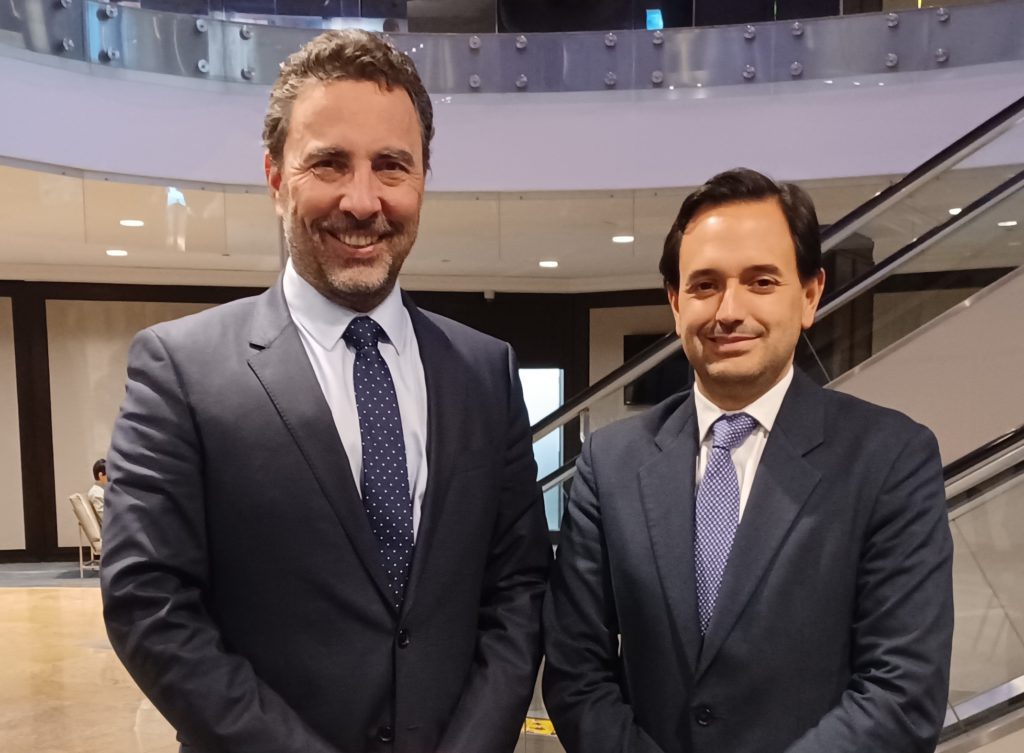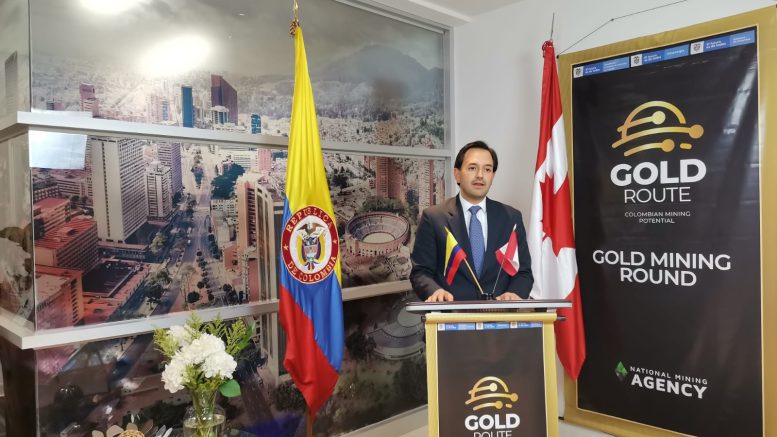Just ahead of a runoff presidential election in Colombia that will determine current president Iván Duque’s successor, The Northern Miner caught up with the country’s Minister of Mines and Energy, Diego Mesa Puyo at the Prospectors and Developers Association of Canada (PDAC) convention on June 13 in Toronto.
Colombia has been trying to diversify its mining sector away from thermal coal, and Mesa has overseen the launch of copper and phosphate “strategic mining areas” — high-potential areas that the government identifies and opens up for bidding — since early 2021. At PDAC, he announced the launch of the country’s first strategic mining areas for gold, opening up four blocks of claims in the department of Antioquia for bidding.
But the June 19 runoff election is looming large in the minds of miners. President Duque is ineligible to run for reelection due to term limits in Colombia. No clear winner was established in a first-round presidential vote on May 29 — and leading in the polls is leftist candidate (and former guerrilla) Gustavo Petro. Petro has promised not to issue new oil and gas exploration permits and also to ban open pit mining.
Mesa, who has been minister for two years (and before that, deputy minister for two years as part of Duque’s pro-business government) sat down with The Northern Miner to discuss the mining-related accomplishments of Duque’s government and the direction of the country’s mining sector going forward.
The Northern Miner: Let’s start with the upcoming election on June 19. There are a lot of miners and exploration companies that are concerned about the possible election of Gustavo Petro as president in the runoff election. How would you allay their concerns?
Mines and Energy Minister Diego Mesa Puyo: I’ll preface this by stating that I should not speak about politics — we officials are banned from getting into political discussions. But what I can tell you is Colombia is very well known in the region for its stability, both politically but more important legally. So this is a country that respects the rule of law, a country that understands the importance of private property and a country that always has honoured its contractual arrangements in the extractive industries and in any other sector.
And this is an asset that the country has that is valued by investors — that is understood by all the entities within government. So what I can tell you is that any contractual commitments that have been made will be honoured, regardless of who is the next president.
It’s very clear, too, that the mining sector which has been very important for the Colombian economy over the centuries is one of the most important sources of development opportunities going forward. Our mining sector has relied over the last 40 years on thermal coal, but we have significant potential to develop metallic minerals and other resources that are needed and in high demand for the energy transition. In this government, we’ve launched the strategic mining areas — first copper, followed by phosphate and today as we speak, we’re launching strategic mining areas for gold.
TNM: Can you explain what a strategic mining area is?
Minister Mesa: Strategic mining areas are areas that we have identified for significant resource potential with work by our National Geological Survey that conducts a lot of studies on geophysics, geochemistry and geological analysis. It’s a way to have projects of national interest be developed.
Obviously the projects have to comply with [laws and regulations] like getting an environmental permit, the technical aspects of the project and if the project has ethnic communities, conduct the prior consultation. But through the strategic mining areas we are able to provide much more assistance and support from the national government to make sure that all these processes advance in a very expedited manner. It’s a similar process to what we’ve done in oil and gas in which there’s a land map and we put the blocks up for competitive bidding through a tender, and this is what we are doing for mining. This figure was in the legislation since 2012, but was not (previously) regulated.

TNM: When was the copper strategic mining area launched?
Minister Mesa: The copper areas were launched in February last year and we already signed one contract and there are four others now in the process of being completed. Phosphate was launched in October, that’s a process that’s open at the moment. We’ve included two areas for coal because there’s been a lot of demand for thermal coal recently and today, we’re launching gold.
TNM: There’s already some gold and copper exploration and mining in Colombia. Why focus on those?
Minister Mesa: Colombia has been a long-established producer of gold, but it hasn’t happened at a large scale. So what we want is to launch significant projects with large companies. We have some operations, but most of it is more midsize and small scale. In October 2020 we put into operation the largest underground gold mine, which was originally developed by Canadian company Continental Gold but then it was sold to Zijin Mining Group. That is in operation at the moment and there’s another project of significant importance which is going to be the largest open pit gold mine that’s developed by B2Gold and Anglo American.
What we’ve determined is that we have two or three corridors for gold and copper, and gold, obviously is a commodity that is always sought after, especially, when you have uncertainty as we have right now because of Covid, because of the war in Ukraine and so forth. And copper, it [occurs naturally in] Colombia because the basin that starts in Chile continues in Peru, it goes all the way to Panama and passes through Ecuador. Colombia is right in the middle, but we haven’t explored much — our copper production is very small, we only have one small mine and the idea is to develop those resources because they are in high demand and will continue to be in high demand because of the energy transition.
There’s also exploration for silver, for platinum, molybdenum, and rare earths near the border with Venezuela.
TNM: Can you talk a little bit about the accomplishments of the current government in mining?
Minister Mesa: In mining, the two main policies have been diversification of the mining [sector], and we’ve talked about the accomplishments already — including launching the strategic mining areas to award contracts for copper, having the first underground gold mine of large scale put into operation, and another open pit mine that’s coming, so I think that the diversification is going pretty well.
The second biggest policy that we have is formalization — bringing informal small miners into the formal sector. And the numbers are very, very encouraging. We had a significant goal when we started the government to bring 27,000 miners into the formal sector and we reached 25,000 a week ago — so we’re over 92% of the goal.
And to put this into perspective, the 12 years before our administration, those three administrations formalized 6,400 miners, so in four years we’re going to be quadrupling what was done in the 12 years before us. We think that’s a very good policy because each mine that is formalized is able to generate between 20 to 60 direct jobs.
And obviously they have to comply with environmental standards, so they stop using mercury or going to the black market for explosives, they get a much better price for their products because it’s now legal and they don’t have to be afraid of being prosecuted. So from a social and economic point of view it’s a very successful policy.
Also worth mentioning is we’ve revamped and expedited all the permitting at the National Mining Agency, so now I think we’re going to close the government with having everything on time and without a significant backlog that we inherited in terms of permitting and that has allowed us also to issue a significant number of contracts.
We’ve awarded up until May the largest number of contracts in the last 16 years. And with significant contracts being also awarded this year, we’re probably also going to have a record year for mining contracts in 2022.


Be the first to comment on "PDAC 2022: Colombia pushes diversification of mining sector as presidential vote looms – interview"